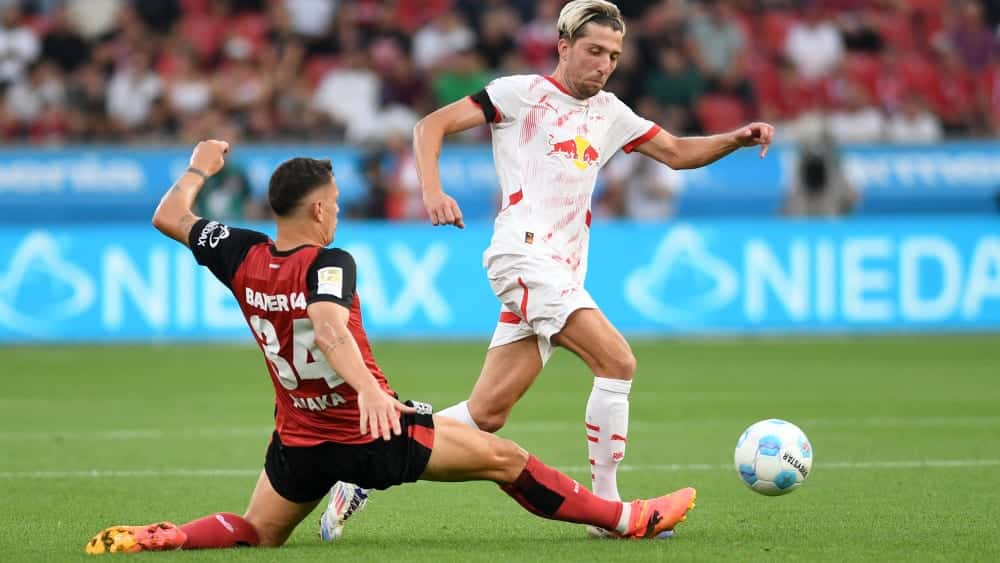As a rule, a sending-off doesn’t help. For Bayer, however, Granit Xhaka’s suspension for Switzerland’s game against Spain is an advantage. On the other hand, a seemingly positive fact about the six-man highlights a problem for the Werkself
When Switzerland take on European champions Spain in the Nations League at the Stade de Geneve in Geneva on Sunday evening, their boss will be missing. Granit Xhaka is suspended following his yellow card in the match against Denmark. Unfortunately for the 31-year-old, who felt that he and his team had been treated unfairly and without the necessary respect, he will now miss the highlight from a Swiss perspective in Group 4 of League A.
Leverkusen will not really be sad about the midfield strategist’s enforced break. After all, coach Xabi Alonso’s extended arm has not really looked fresh in preparation and in the first league games of the new season. No wonder, as the professional has had a real marathon of games behind him. Xhaka was in constant use both at club and international level last season and was not spared by either Xabi Alonso or Murat Yakin
The rotation usually takes place without the Swiss
The rotation in Leverkusen mostly took place without the left-footer. The same was not true for the national team, with whom Xhaka reached the quarter-finals of the EURO (3:5 in the final against England). After that, he only had three weeks off, during which he also had to recover from a torn muscle fiber
Xhaka’s suspension and the associated opportunity to regenerate is therefore not inconvenient for Bayer, both acutely and in view of the upcoming mammoth program, which includes a permanent English week. 90 minutes less at the highest level for Xhaka doesn’t really sadden anyone at Bayer 04
The statistics suggest a fresh Xhaka
The statistics suggest that the record-breaking Swiss international must be full of juice. After all, he completed an average of 20 sprints in the first two Bundesliga games in Gladbach (3:2) and against Leipzig (2:3) – significantly more than in the previous season, when he “only” completed 14 sprints per 90 minutes.
However, this supposedly positive figure is only proof that something is acutely wrong in Leverkusen’s game. If one cog in the Werkself’s game and tactics fits into another, Xhaka doesn’t need that many runs at top speed. After all, his game is primarily characterized by the fact that he is at the heart of it and directs it offensively through his passing and not through highly dynamic forays, for which more sprints would be a quality criterion
But the six-man, who turns 32 at the end of September, has to do this so often because Bayer 04 are not as compact at the moment and there are greater gaps than usual between the individual parts of the team. Xhaka and his partner in the double six, be it Aleix Garcia or Robert Andrich, often have to defend much larger spaces behind them. And when the opponent finds them, which is obviously easier than in the double season, Xhaka and Co. are forced to run after them at top speed
The more Xhaka has to sprint, the worse Bayer 04 performs
In short: The more Xhaka has to sprint, the worse Bayer 04 functions as a team tactical entity. And since neither Xhaka nor his colleagues on the double-six are proven high-dynamic players, this style of play, which is forced by losing the ball too soon, really hurts the Werkself.
“We didn’t have enough control in the second half. Everything was very fast, we didn’t play enough passes in the opponent’s half. The game was too open,” Xabi Alonso complained after the 3-2 defeat to Leipzig. The team’s tactical starting points ahead of the game at 1899 Hoffenheim are therefore clear. Granit Xhaka would certainly be the one who would be most pleased if Bayer’s ping-pong soccer quickly became a thing of the past again.





